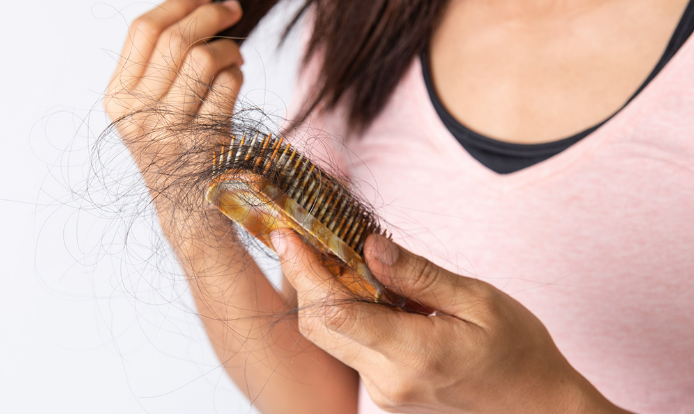Hair fall is a common concern that affects millions of people worldwide, regardless of age or gender. While it’s normal to lose a certain amount of hair daily, excessive hair loss can be distressing and may indicate underlying health issues. Fortunately, understanding the causes of hair fall and implementing effective remedies can help manage and even reverse this condition. In this article, we’ll explore the various factors contributing to hair fall and discuss practical solutions to promote healthy hair growth.
1. Common Causes of Hair Fall
Hair fall can be triggered by a variety of factors, ranging from lifestyle choices to medical conditions. Understanding these causes is the first step toward finding an effective solution.
- Genetics: Hereditary hair loss, also known as androgenetic alopecia, is the most common cause of hair fall. It affects both men and women and typically manifests as thinning hair or baldness over time.
- Hormonal Imbalances: Hormonal changes due to pregnancy, menopause, thyroid disorders, or polycystic ovary syndrome (PCOS) can lead to hair fall. In men, high levels of dihydrotestosterone (DHT) can shrink hair follicles, leading to male pattern baldness.
- Stress: Physical or emotional stress can push hair follicles into a resting phase, leading to temporary hair shedding. This condition, known as telogen effluvium, usually resolves once the stress is managed.
- Nutritional Deficiencies: A lack of essential nutrients, such as iron, zinc, biotin, and vitamins A, D, and E, can weaken hair and cause it to fall out. Poor diet and certain eating disorders can contribute to these deficiencies.
- Medical Conditions: Conditions like alopecia areata (an autoimmune disorder), scalp infections, and chronic illnesses can result in significant hair loss.
- Medications and Treatments: Certain medications, such as those for cancer, depression, arthritis, and high blood pressure, can have side effects that include hair loss. Additionally, treatments like chemotherapy can cause temporary but severe hair loss.
- Hair Care Practices: Overuse of heat styling tools, chemical treatments, tight hairstyles, and harsh hair products can damage hair, making it prone to breakage and fall.
2. Preventing Hair Fall
Prevention is often the best cure when it comes to hair fall. Adopting healthy habits and making mindful choices can help reduce the risk of excessive hair loss.
- Balanced Diet: Ensure your diet is rich in essential nutrients that promote hair health. Include foods high in protein, iron, omega-3 fatty acids, and vitamins like B-complex, C, D, and E. Leafy greens, nuts, seeds, fish, eggs, and lean meats are excellent choices.
- Gentle Hair Care: Treat your hair gently to avoid unnecessary damage. Use mild shampoos and conditioners suited to your hair type, and avoid excessive use of heat styling tools. When detangling, use a wide-toothed comb to minimize breakage.
- Stress Management: Practice stress-reducing techniques such as yoga, meditation, deep breathing, or regular exercise to keep stress levels in check. Maintaining a balanced lifestyle can have a positive impact on both your mental health and hair health.
- Avoid Tight Hairstyles: Hairstyles that pull on the hair, like tight ponytails, braids, or buns, can cause traction alopecia, leading to hair fall. Opt for looser styles that put less strain on your hair.
- Limit Chemical Treatments: Frequent coloring, perming, or straightening can weaken hair and increase the risk of hair fall. If possible, reduce the frequency of these treatments or opt for gentler, natural alternatives.
3. Effective Remedies for Hair Fall
If you’re already experiencing hair fall, several remedies can help restore hair health and encourage growth.
- Topical Treatments: Minoxidil is a widely used over-the-counter topical treatment that can help regrow hair in cases of androgenetic alopecia. It works by stimulating hair follicles and prolonging the growth phase of hair.
- Prescription Medications: For more severe cases, prescription medications like finasteride (for men) or spironolactone (for women) may be recommended by a healthcare professional. These drugs work by blocking the effects of DHT, which contributes to hair loss.
- Supplements: Taking supplements that contain biotin, iron, zinc, and vitamins can support hair health, especially if your diet is lacking in these nutrients. Always consult a healthcare provider before starting any supplement regimen.
- Hair Oils and Masks: Natural oils like coconut, argan, castor, and rosemary oil have been traditionally used to strengthen hair and promote growth. Regular scalp massages with these oils can improve blood circulation and nourish hair follicles.
- Platelet-Rich Plasma (PRP) Therapy: PRP therapy involves injecting your blood’s platelet-rich plasma into the scalp to stimulate hair growth. This treatment is gaining popularity for its effectiveness in treating thinning hair and promoting new growth.
- Hair Transplant Surgery: For those with advanced hair loss, hair transplant surgery offers a more permanent solution. The procedure involves moving hair follicles from a donor area to the balding areas, resulting in natural-looking hair growth.
4. When to Seek Professional Help
If you’re experiencing sudden, severe, or unexplained hair fall, it’s important to consult a healthcare provider or a dermatologist. They can diagnose any underlying conditions contributing to your hair loss and recommend appropriate treatments.
Hair fall can be a distressing experience, but with the right approach, it’s often possible to manage and even reverse the condition. By understanding the causes, adopting preventive measures, and exploring effective treatments, you can take control of your hair health and enjoy a fuller, healthier mane.


